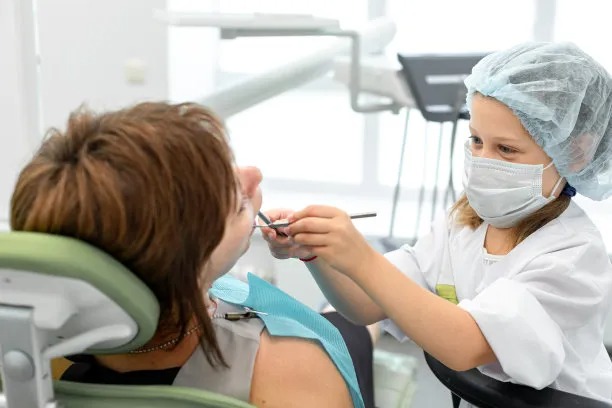Summary: Dental fillings are essential interventions for treating cavities and preserving oral health. However, ensuring their success requires careful measures before, during, and after treatment. This article will address essential precautions to be taken to ensure a successful dental filling and maintain optimal oral health thereafter. Key areas of focus will include choosing a qualified dentist, adhering to post-treatment care instructions, maintaining proper oral hygiene practices, and regular dental check-ups. By following these guidelines, individuals can enhance the longevity of their fillings and promote overall dental well-being.
1. Choosing a Qualified Dentist for Your Filling

One of the most crucial steps in ensuring a successful dental filling is selecting a qualified dentist. It is essential to research and find a dental professional with the right credentials and experience in restorative dentistry. You can ask for recommendations from friends or family, or check online reviews and ratings of local dental practices.
Additionally, a competent dentist should take time to explain the filling procedure thoroughly. A detailed consultation will provide insights into the materials that will be used, the technique applied, and the aftercare that will be necessary. Clients should always feel comfortable asking questions and discussing their concerns during this process.
Lastly, don鈥檛 hesitate to ensure that the dental office utilizes modern technology and follows stringent hygiene protocols. An office that prioritizes both patient care and infection control is more likely to provide a successful dental filling experience.
2. Adherence to Post-Treatment Care Instructions
After receiving a dental filling, it鈥檚 vital to adhere closely to the post-treatment care instructions provided by your dentist. These guidelines may include avoiding certain foods and beverages for a specified period. For instance, hard, sticky, or extremely hot items can compromise the filling and cause it to dislodge or crack.
Moreover, it鈥檚 essential to be aware of any potential side effects following the procedure. While some discomfort is normal, excessive or prolonged pain should prompt a follow-up visit to the dentist. Immediate attention will prevent complications and ensure that the filling remains intact.
Finally, dental fillings may take time to fully set and harden. Avoiding any rigorous chewing or biting activities can significantly reduce the risk of damaging the filling while it is still curing. Following these simple yet effective measures ensures the longevity of your dental work.
3. Maintaining Proper Oral Hygiene Practices
Good oral hygiene is foundational for maintaining both your fillings and overall oral health. After the procedure, it is crucial to brush your teeth at least twice a day and floss daily. This routine helps to eliminate bacteria and food particles that may accumulate around the filling.
In addition, consider employing fluoride toothpaste, which can strengthen tooth enamel and reduce cavity formation. Since fillings are not foolproof structures, taking additional precautions can contribute to their durability and functionality. It鈥檚 also advisable to avoid overly abrasive mouthwashes that may irritate the gums around the filling.
Regularly replace your toothbrush every three to four months. A worn-out brush may not clean effectively, leaving harmful plaque around your fillings. Instead, opt for a soft-bristled toothbrush to gently remove debris without damaging your dental work.
4. Regular Dental Check-Ups for Early Detection
Scheduling regular dental check-ups is an essential precaution for ensuring ongoing oral health. These visits allow your dentist to monitor the condition of your fillings as well as your overall dental health. By attending these appointments, problems can be identified early and addressed before they escalate into more serious issues.
During these check-ups, your dentist may also provide professional cleanings, which can help maintain the longevity of both fillings and natural teeth. This additional cleaning prevents plaque build-up and ensures that all areas of your mouth are kept as healthy as possible.
Finally, make sure to inform your dentist about any changes in your oral health, such as sensitivity or discomfort around the filled area. These indicators can signify underlying problems that may require attention, ensuring you stay ahead of potential complications.
Summary:
In summary, essential precautions play a vital role in ensuring a successful dental filling and maintaining oral health post-treatment. Selecting a skilled dentist, adhering to post-treatment instructions, maintaining excellent oral hygiene, and scheduling regular check-ups can significantly enhance the longevity of your dental fillings.
This article is compiled by Vickong Dental and the content is for reference only.
Vickong Dental
Vickong Dental is a large medical group established in Hong Kong in 2008 by professors from well-known medical universities in Guangdong and Hong Kong, as well as medical doctors from key national '985' universities (including Master's supervisors and senior professors). The chain of branches brings together expert dentists with PhDs and Master's degrees from Hong Kong and Mainland China, committed to providing high-quality dental treatment.
"Vickong Dental Practices the University Motto of 'Healing and Serving Society,' with a Stable Operation for Sixteen Years. It Has Been honored with Hong Kong Enterprise Leaders's Choice,' and is a Global Trusted Implant Center for the Nobel Implant System. Recommended by Hong Kong Metro Broadcast and Guangdong Television, it Serves Customers from Over Thirty Countries and Regions, Gaining the Trust and Favor of Citizens from the Guangdong-Hong Kong-Macau Greater Bay Area and Surrounding Cities.

Thousands of customers' unanimous praise
The most recognized and highly recommended dental service by customers in the Guangdong-Hong Kong-Macau Greater Bay Area
We Ensure You Receive Detailed Care and Attention Here
Hong Kong standards, Shenzhen prices, Your Trusted English-speaking dentists

Vickong Dental Medical-Grade Instrument Disinfection Process
Vickong Dental Medical-Grade Instrument Disinfection Process

Vickong Dental Chain: A Warm and Comfortable Environment for Treatment






Appointment Hours

Q&A
Why choose Vickong Dental?
Vickong Dental practices the university motto 「Medicine to Benefit Society」, with each branch bringing together highly qualified dentists with doctoral and master’s degrees from Hong Kong and the Mainland, and has maintained seventeen years of steady operation。Recipient of 「2024 Hong Kong Enterprise Leaders Brand」, 「2025 Hong Kong Enterprise Leaders Brand」, a Nobel Biocare Global Trusted Implant Center, and a brand recommended by Metro Radio Hong Kong and Guangdong TV。
To date, we have served customers from more than thirty countries and regions,earning exceptionally high word-of-mouth recognition and trusted recommendations from residents across the Guangdong-Hong Kong-Macao Greater Bay Area and surrounding cities
We have eight major branches in Zhuhai、Shenzhen,and a consultation and service assurance center in Hong Kong,so you can book a free consultation at any time for any questions,which is very reassuring.
If I do not accept the quotation after the CT scan, will I be charged??
No! As long as the actual treatment has not started, you will not be charged any fees.
Will there be any additional charges during the treatment process?
No, there won’t be any additional charges. Before treatment begins, we will clearly explain the treatment plan and its corresponding fees. Only after the patient agrees and signs the consent form will we proceed with the dental service.
Can I pay in Hong Kong dollars?
Yes. Vickong Dental accepts payment in Hong Kong dollars. The amount will be converted based on the exchange rate of the day, and the applicable rate will be clearly communicated to you in advance.
Can I reschedule my appointment at any time?
Yes. Please contact us via **WeChat** or **WhatsApp** as early as possible, providing your original appointment time and details, along with your preferred new date and time slot for rescheduling.













